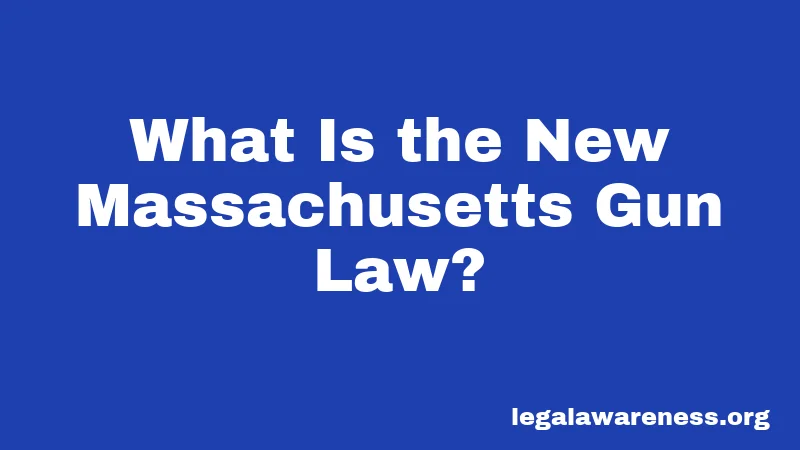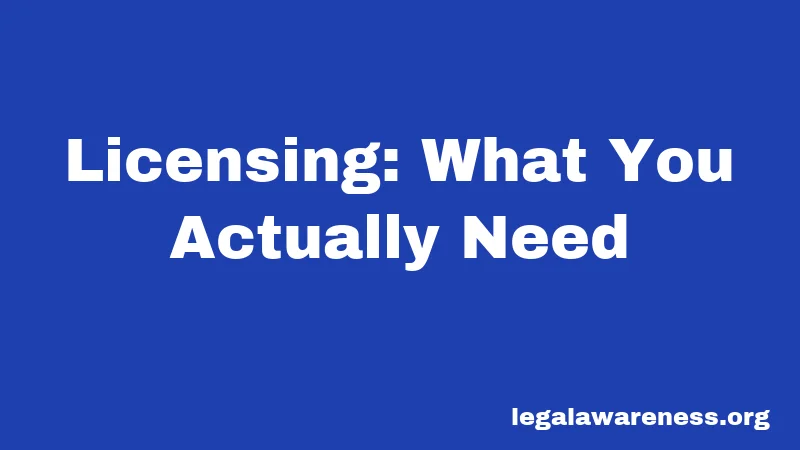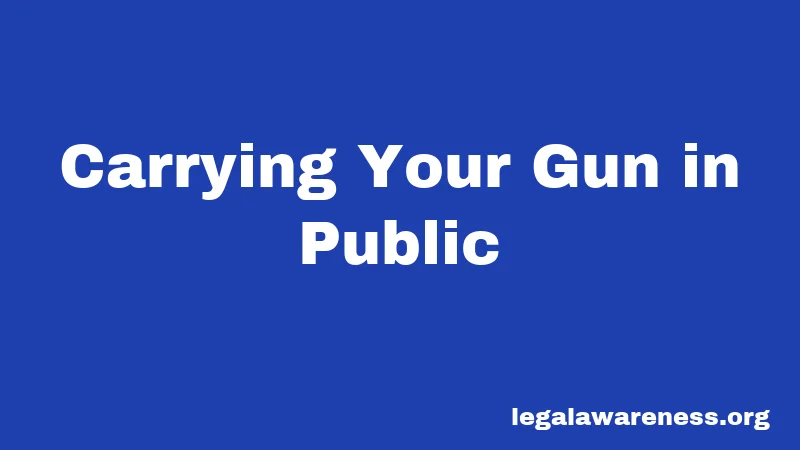Massachusetts Gun Laws in 2026: Big Changes Coming Your Way
You’re probably not following every law change in your state. That’s okay, most people aren’t. But if you own a gun in Massachusetts or are thinking about buying one, you need to pay attention to what’s happening right now. Massachusetts just made some serious changes to its gun laws, and they’re going to affect you.
Ready? Here’s what you need to know.
What Is the New Massachusetts Gun Law?

In July 2024, Massachusetts passed something called Chapter 135. Governor Healey signed it right away, and it took effect in October 2024. This law changed how guns work in Massachusetts.
Think of it like this: Massachusetts already had strict gun laws. Pretty strict. Now they’re even stricter. The goal is to keep track of every gun in the state and keep guns out of hands that shouldn’t have them.
The Biggest Changes You Need to Know
All Guns Must Now Be Registered
Here’s the big one. Starting in 2026, every single gun in Massachusetts needs to be registered with the state. Right now, you can check your current situation. Does this apply to you? Good question, because the answer depends on what gun you own.
Before 2026, only handguns and some specific rifles had to be registered. Now? Everything changes. Every rifle. Every shotgun. Every gun you own must be reported to the state.
The state is building a system called the “Unified Gun Portal” where all this info goes. They gave gun owners one year to comply once the system goes live. If you don’t register by the deadline, you could face serious penalties.
New Handgun Rules
Wait, it gets more specific. New handguns coming into Massachusetts now have to be on an “approved list.” The state decides which handguns are allowed to be sold. If a handgun isn’t on that list, stores can’t sell it here. Period.
This makes sense, right? The state wants to know exactly which models are available and who’s buying them.
Ghost Guns Are Now Illegal
Ever heard of a ghost gun? They’re basically homemade firearms. Untraceable. No serial number. No way for police to track them. Massachusetts decided that’s not happening here anymore.
You can’t make them. You can’t possess them. You can’t transfer them. It’s illegal. Creating a ghost gun could land you 12 to 18 months in jail.
Hunting and Visitors Got Stricter Rules
Here’s something that surprised a lot of people. If you’re visiting Massachusetts from out of state and you want to hunt, you’ve got new limits. Non-residents under 18? You can’t hunt with a firearm at all. Non-residents also can’t use semi-automatic rifles or shotguns for hunting.
If you’re a visitor who wants to carry a gun while you’re here, you need to register that firearm before you show up.
Licensing: What You Actually Need

Not sure what kind of license you need? Let me break it down. Massachusetts has two main types.
The FID Card (Firearm Identification Card)
An FID card lets you buy and carry rifles and shotguns. But here’s the catch: only the basic ones. Non-large capacity. Non-semiautomatic. That’s it. If you’re 18 or older (and younger with parental consent), you can apply.
Cost? $100 for six years. The card expires after six years, so you have to renew it.
The License to Carry (LTC)
This is the bigger license. An LTC lets you buy, carry, and possess basically any legal firearm. Handguns. Large-capacity weapons. Semiautomatic rifles. Everything (that’s legal).
But you have to be 21 to get one. It also costs $100 and lasts six years.
What You Have to Do to Get Licensed
Want either license? You’ve got steps to follow.
First, take a certified firearms safety course. This is new-ish. Massachusetts requires it. The course covers handling, storage, and safety. It’s usually a one-day thing taught by instructors the state approves. You could also take a hunter education course instead if you qualify.
Second, apply at your local police department. Bring your safety course certificate. Fill out the forms. Get fingerprinted. Answer questions honestly—seriously, lying on the application is a crime.
Third, wait. The police have 40 days to approve or deny you. They run a background check. They look at your criminal history, mental health records, and restraining orders. If anything disqualifies you, they’ll deny the application.
You can appeal a denial in district court, but it’s tough.
New Rules for Semi-Automatic Rifles
Here’s where things get complicated. Starting with Chapter 135, semi-automatic rifles and shotguns are treated differently. You now need an LTC to possess them. An FID card isn’t enough anymore. About 21,000 people in Massachusetts who only had FID cards suddenly had semi-automatic guns they technically shouldn’t have. The law gave them time to deal with that, but it’s important.
Storage Requirements: The Law Is Serious
Not in direct control of your gun? It goes in a locked container. Full stop. This isn’t optional. Massachusetts takes this seriously.
Your gun must be stored locked, unloaded, and separate from ammunition. You can use a locked safe. A locked box. A device with a tamper-resistant lock. Whatever works. The point is making it impossible for someone else—especially a kid—to grab it and use it.
If you get caught with an unsecured firearm, law enforcement can confiscate it. They might revoke your license. You could face fines and jail time. It’s not worth the risk.
Carrying Your Gun in Public

Okay, so you’ve got your LTC. Now what? Can you just carry your gun around Massachusetts?
Mostly, yes. But there are places you can’t. You can’t carry in schools. You can’t carry in polling places. Government buildings are off-limits. There are other restricted areas too.
Also, understand this: Massachusetts doesn’t recognize gun licenses from other states. If you move here with an out-of-state permit, it’s worthless. You need a Massachusetts license.
Penalties: What Happens If You Mess Up
Sound complicated? It’s actually not. But here’s where you need to pay close attention.
Massachusetts doesn’t mess around with gun violations. The penalties are serious.
Unlicensed Possession
Want the scary one? Possessing a gun without a license carries a mandatory minimum of 18 months in jail. If the gun is loaded? Even worse. This is a felony.
Ghost Gun Possession
Making, possessing, or transferring a ghost gun gets you 12 to 18 months in prison. Minimum.
Illegal Assault Weapons
Owning or possessing something the state calls an assault weapon can land you 18 months minimum prison time. Fines up to $10,000 are also possible. Sometimes both.
Registration Violations
Fail to register a firearm? The penalties depend on how many times you’ve messed up before:
- First offense: Fine up to $1,000
- Second offense: Fine up to $7,500 or six months jail, or both
- Third offense: Fine up to $10,000 or 1 to 5 years in prison, or both
Plus, failure to register can get your license revoked. Permanently.
Loss or Theft
You must report a lost or stolen gun within 7 days. Seriously. Report it to your local police and to the state system. Fail to do this and you could lose your license.
The 2026 Referendum: What You Should Know
Hold on, this part’s important. Gun rights groups collected signatures to put Chapter 135 on the ballot in 2026. They want voters to repeal the new law.
The referendum will happen. Voters will decide. If you care about this either way, pay attention to the 2026 ballot. This could change Massachusetts gun laws significantly.
Special Circumstances and Exemptions
Not everyone’s in the same boat. Some people have exceptions or different rules.
Law Enforcement
Police officers have different rules. Same with military personnel. They’re generally exempt from licensing requirements because of their jobs.
Temporary Visitors
Non-residents can get a temporary License to Carry if they’re traveling through Massachusetts. You have to apply through State Police, though. It’s not automatic.
Older Magazines and Weapons
If you owned a large-capacity magazine before September 13, 1994, you can keep it. It’s grandfathered in. Same with certain older assault weapons. But if you bought them after that date? They’re not legal anymore.
How to Apply and Register Your Guns
Here’s the practical stuff. What do you actually do?
First, find your local police department’s licensing office. They handle everything. Some towns have dedicated firearm licensing people. Others make you talk to the regular police desk.
Second, complete a firearms safety course. Search for “Massachusetts certified firearms safety course” and pick one. Cost is usually around $50 to $150.
Third, submit your application online through the MIRCS Unified Gun Portal or in person at your police department. Include your safety course certificate.
Fourth, pay the $100 fee. Yes, it costs money.
Fifth, wait. 40 days is the deadline for approval or denial.
Once you get your license, you’ll need to register any guns you own through the same portal. When the registration system fully launches (expected late 2025 or early 2026), you have one year to register everything.
Don’t miss the deadline. The penalties are real.
Frequently Asked Questions
Can I carry my gun from another state into Massachusetts? No. Massachusetts doesn’t recognize out-of-state permits. You need a Massachusetts license, period.
What exactly counts as a large-capacity magazine? Any magazine that holds more than 10 rounds of ammunition or more than 5 shotgun shells. If you bought it before September 13, 1994, you can keep it. After that date? Illegal.
Is there a fine for carrying a gun without a license? Way worse than a fine. You face mandatory 18 months in jail minimum. That’s assuming the gun isn’t loaded, which makes it even more serious.
Can I own a gun if I have a restraining order against me? No. You’re prohibited from possessing firearms. If you already have a license, it gets revoked.
What’s this Extreme Risk Protection Order thing I keep hearing about? It’s the “red flag law.” If someone thinks you’re a danger to yourself or others, they can petition the court to take your guns. You have to surrender your license and all firearms. It’s a legal process, but it’s effective.
Final Thoughts
Massachusetts has some of the strictest gun laws in America. They’re getting stricter. Chapter 135 makes sure the state knows where every gun is and who owns it. It keeps untraceable weapons out. It tightens requirements for licensing.
If you own a gun in Massachusetts, understand these laws. Register your firearm. Take the safety course. Follow the storage rules. Keep your license current. Don’t carry where it’s illegal.
If you’re not sure about something? Call your local police department’s licensing office. They can answer specific questions about your situation. When in doubt, ask. It’s better to ask now than break a law you didn’t know about.
Stay informed. Stay safe. Stay legal.
References
- Massachusetts Executive Office of Public Safety and Security. “An Act Modernizing Firearm Laws Guidance 4.” https://www.mass.gov/doc/an-act-modernizing-firearms-laws-guidance-4/download
- Massachusetts General Laws, Chapter 140, Section 131. Massachusetts gun ownership and licensing regulations. https://malegislature.gov/Laws/GeneralLaws/Part1/Title20/Chapter140
- Massachusetts General Laws, Chapter 140, Section 121B. Firearm registration requirements and penalties. https://malegislature.gov/Laws/SessionLaws/Acts/2024/Chapter135
- Massachusetts Division of Fisheries & Wildlife. “Gun Ownership in Massachusetts.” https://www.mass.gov/info-details/gun-ownership-in-massachusetts
- Massachusetts Firearms Records Bureau. “Firearms License and Transaction Frequently Asked Questions.” https://www.mass.gov/info-details/firearms-license-frequently-asked-questions
- Giffords Law Center. “Licensing Laws in Massachusetts.” https://giffords.org/lawcenter/state-laws/licensing-in-massachusetts/
- Congressional Sportsmen’s Foundation. “Massachusetts’ New Gun Laws.” https://congressionalsportsmen.org/news/massachusetts-new-gun-laws/
- Ballotpedia. “Massachusetts Firearm Regulations Referendum (2026).” https://ballotpedia.org/Massachusetts_Firearm_Regulations_Referendum_(2026)
